#music criticism
Text


LITERARY DIGEST, March 26, 1927

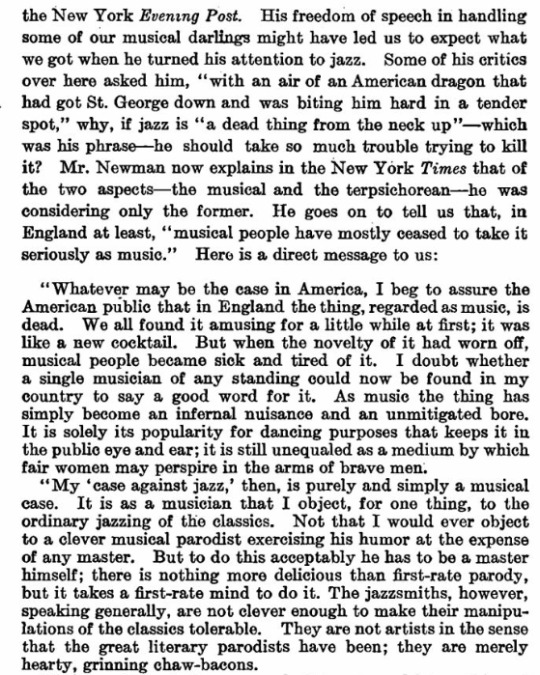

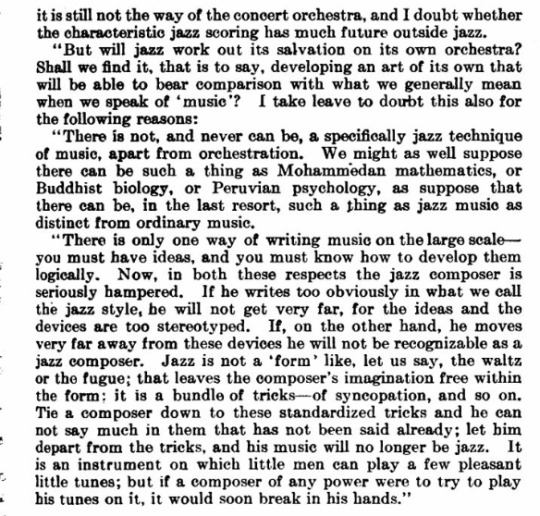
What did Duke Ellington have to say about this? You won't find out here....
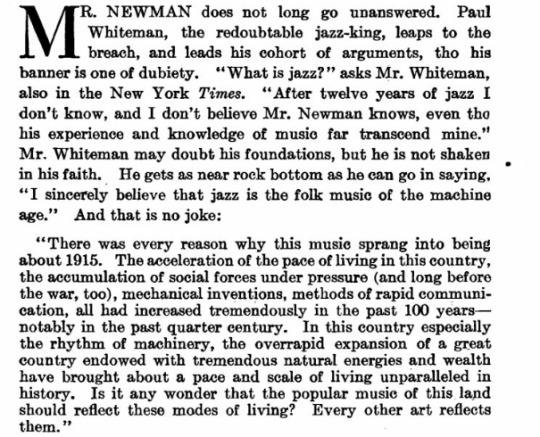

#1920s#jazz#music criticism#music snobbery#elitist philistinism#ernest newman#paul whiteman#miguel covarrubias
40 notes
·
View notes
Text
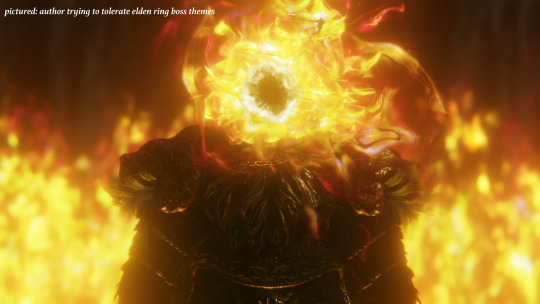
Hey! I have another new piece available to read on my Substack page:
PREPARE 2 SIGH: The Music of Dark Souls, etc.
A version of this piece was originally on my blog here, years ago, but -- I genuinely can't remember doing this, or why I would've done it -- it looks like I deleted it. I'd been wanting to write about the Dark Souls series' and Elden Ring's soundtracks after being disappointed (once a-fucking-gain) by the latter's music, so I recovered the lost article via Wayback Machine and have greatly edited and added to it.
As with the piece on Xenogears' soundtrack, I suppose I've taken a position against a majority opinion, but then that's the way of things usually with myself, it seems. Very good!
#dark souls#elden ring#soulsborne#fromsoftware#videogame music#soundtrack#vgm#videogame criticism#music criticism
21 notes
·
View notes
Text
My thoughts on Fuck The World by Sematary, Hackle, and Sosa
Haunted Mound's music and the discourse surrounding it exemplifies the fact that you can't truly "win" in the music scene as a whole, you will have haters don't matter what (unless you are a blonde woman who sings folky pop music and people treat you like a god and the ones who dare to dislike you are called misogynists or even nazis).
Sematary is widely known for his quick uprising to underground hip hop hegemony being compared to groups like Drain Gang, Goth Money, and G59, the thing about his music is how the direction he started his music attracted a particular audience who were at most interested in the witch house + emo + plugg fusion he did with his partner Ghost Mountain, but as time passed, Grave Man changed his style to noisier and drill oriented, talking about violence and murder on a more Horrorcore fashion instead of the peep-esque emo misanthropy of his debut albums. The noisier style is often fused with black metal music.
The issue here is how the paradox of innovation applies to his art, you see if he kept the style he had with Ghost Mountain to this day, people would call him repetitive and one-note. If he kept the black metal style of the Rainbow Bridge saga, he would be called one note and repetitive. And because he is keeping the violent dissonant witch drill style, he is being called repetitive and one-note. But there is also the fact that every time he innovates his style to a new direction, he alienates a part of his audience, as he alienated people who wanted more black metal-style music, and he alienated the Ghost Mountain fan audience who wanted more emo witch plugg. That's why I say that he is stuck on a paradox where he can't truly win everybody and by scrapping KOTG 2 because of its poor reception, he is playing by this game that he can't win, since he has constantly shown how much he cares about the opinions of others, he doesn't "do what he wants to do" as he claims to, if he did, he wouldn't scrap songs based on other's people reception.
Now, about the song, it's truly overhated by the Haunted Mound fanbase. Yes, Sematary's lyrics are freestyled and this makes them incredibly cheesy, but the cheese of lyricism is what gives Horrorcore music its particular charm, we are talking about a genre where one of its pioneers had lyrics about having sex with pigeons. Hackle and Sosa's verses are more gangsta-oriented and don't look freestyled at all, which gives the song a notorious quality jump from there. with Keef's verse being the best of all and giving me personally an adrenaline jump unique to him, I would mosh to his verse despite hating crowded environments.
#stoneflower's pseudo journaling#stoneflower writing#haunted mound#music criticism#music#sematary#hackle#chief keef#glo gang#ftp#horrorcore#horrorcore rap#hip hop#underground hip hop
13 notes
·
View notes
Text
The grammatical metaphor of music is popular in compositional instruction, and it likely has some utility, however, I believe that it is more limiting then helpful.
choral music can be a good example of this, so here is an excerpt from carol of the bells (with the original Ukrainian lyrics)

the contrast between the melodic movement and the lyric movement should be obvious.
this entire piece is constructed around that single bar repeated lic, which repeats, exactly the same, for 42 of 54 bars. in those remaining 12 bars the lic is passed to a less prominent register, but It's still there.
(Note also; this lic doesn't resolve, in the grammatical metaphor it isn't a full sentence, it's a fragment.)
it would be nonsensical to write a poem with a structure this repetitive, and we can see that in the lyrics, which contain much less repetition.
However, it is this repetition that makes the piece work, it ties sections together and gives the music a clear and catchy structure.
Fundamentally, speech is a symbolic medium, but melody is abstract. So I, personally, have never seen why there should be any conceptual overlap between the two.
#music theory#music#musicians on tumblr#carol of the bells#choir#classical music#composition#music criticism
16 notes
·
View notes
Text
PORTER ROBINSON - "CHEERLEADER"
youtube
April Fool's Day is over, now time for some SINCERITY...
[5.92]
Taylor Alatorre: This song sounds embarrassing. It sounds excessive. It sounds like something you might regret putting into the world five seconds after hitting "publish." It sounds, in other words, like high school. Porter Robinson's post-brostep career has been an extended treatise on escapism -- from the appealingly plaintive paracosms of 2014's Worlds to the soothing self-inventory of 2021's Nurture, with his Virtual Self side project managing to be both esoteric and stupidly self-explanatory. He's crafted a series of immersive alternatives to analog messiness, allowing the listener to check out of the everyday and place themselves for a moment in a softer-edged realm, with more explicable rules and a more poetic set of problems. "Cheerleader," though, offers the listener no assistance in either sidestepping or reconfiguring the uncomfortable reality into which they were born; music video aside, it's not really a song about fanbases gone wild either. Instead it's about the girl in your school's Anime Club who gave out her deviantART username before her phone number and taught you against your will what the word yaoi meant. The fujoshi representation, besides filling a glaring gap in the TSJ search index, makes it clear that this is about a real person and not an avatar, and it's that awkward flesh-and-blood realness which is precisely at issue here. Maybe she's as real as him, and maybe he couldn't live with that. The perspective of a boy who is unused to being the object of obsession is an under-explored one in music, probably because it's very hard to land it within the narrow range of acceptable loserdom. But Porter sticks the landing by enveloping us fully within the loser's headspace, where both his emo-inflected chagrin and his fragmented memories of the girl's "cheering" are enshrouded by a waterfall of blown-out Obama-era detritus. If you ever wondered what a big room house remix of Two Door Cinema Club might've sounded like, or Oracular Spectacular if it had debuted on Beatport, here's your answer. Other seemingly out-of-place additions -- the bitpop cowbell, the Punk Goes Acoustic bridge, the hilariously overwrought drumroll that becomes less so the second time around -- fit right into this 1080p capture of late adolescent bag-fumbling. Taken together, they convey a mismatch in interests and hobbies that may have seemed like a deal breaker at the time, but in hindsight was just another excuse to avoid vulnerability. Perhaps I only arrived at this gonzo interpretation because the 4chan-core single artwork serves as a kind of shibboleth for these things. If that's the case, then I plead guilty: I ate the apple.
[10]
Oliver Maier: "We have Anamanaguchi at home."
[6]
Hannah Jocelyn: I loved Porter Robinson's Nurture for its unapologetic sincerity, a balm when emerging back into the world post-lockdown. I miss that early hopefulness as the years have gone on; even now, it's hard for me to hear "Unfold" without being close to tears. "Cheerleader" is a frustrating detour, with inane lyrics about yandere fujoshis fetishizing Robinson -- you know you're doing nothing new when the Nostalgia Critic beat you to it, and Robinson hardly sells the can't live with 'em, can't live without 'em message better. Nurture, for better or worse, incorporated the pitch-shifting vocals of hyperpop into EDM (to the point where a trans woman musician I know grew frustrated with Nurture's acclaim for doing what acts like Katie Dey had done for years, regardless of how Robinson himself identifies.) That's worth acknowledging, especially as this attempts to go right to the source: 3OH!3 and Metro Station come to mind. Except there’s none of the polish that makes those songs work despite themselves -- What's with that tinny hi-hat? Where's the low end on the guitar? Listen to "Shake It"; that song from 2007 sounds better than this one from 2024. It's not enough to replicate the aesthetics; for some ungodly reason, Robinson decided it must sound like it's coming from a Hot Topic speaker too.
[4]
Claire Biddles: We have "Shake It" by Metro Station at home.
[4]
Tim de Reuse: I admire the chutzpah to take a stylistic hairpin turn like this. And I appreciate the ability to do that while retaining the crystal-clear boom-bap production chops that made you a breakout sensation in the first place. And I appreciate how it makes its power-pop references clear without sticking to them too desperately. And I appreciate the sheer craft; birds fly, rocks sink, Porter Robinson writes synth hooks that wrap around your mind and squeeze tight. And I appreciate the line about getting drawn kissing other guys. But there's a clean and edgeless quality here, a sterile expression of his EDM roots, that directly contradicts his attempts at a heartbreaking singalong. Nowhere does his voice crack with raw emotion; nowhere does it seem even possible that his voice might crack with raw emotion.
[5]
Kayla Beardslee: Porter Robinson’s doing anime OSTs now? Good for him.
[7]
Leah Isobel: I see this fitting into a whole universe of PS1/Nintendo DS aesthetic indie games, YouTube video essays about old anime, trans girls with Neocities websites, indie pop sung by vocaloids. I could call it hyperpop -- not in the sense of overdriven chaos, but in the sense of the hyperlink. (HTML revival would be more accurate.) As such, it feels a little too precise, its scruffiness deployed too purposefully; I feel like this stuff works best when the self is obscured, and Porter is too big of a star to let that happen. But that also means the chorus is fucking massive, so I can't complain too much.
[7]
Nortey Dowuona: The soft, limply placed drums in the song for once are not the sabotaging element in this song. The lithe, acoustic guitar bridge is even nicely played. The guitar riff, doubled by the synth, is the true arrow to the heart of this song. Porter is processed to hell and back, refusing to give over his composition to a more present, entertaining vocalist, but that riff is so grating and stiff that when it first arrives, sliding up as the culmination of the slowly hopping pre-chorus, it stops the song from progressing any further, simply pushing Porter into the background and leaving his Melodyned voice slack below it, struggling to be heard. Now, does this stop me from screaming that chorus in my head? Of course not. It's not fair I have to keep hearing this grating riff every time, though.
[6]
Ian Mathers: God, I love that recurring, overdriven synth sound that kicks in on the chorus. If anything I wish it was more all-enveloping when it hits (yes, like shoegaze, yes, I'm predicable). There's lots of other interesting things going on here, but I can't quite get over that visceral rush enough to figure out my response to it all. Hit the whoosh button again, Porter!
[8]
Jacob Sujin Kuppermann: Not nearly dumb enough for me to enjoy its shtick.
[3]
Isabel Cole: This sounds like a One Direction album track in a universe where after they got kicked off The X Factor, Simon Cowell realized he could save so much money by replacing everyone but Liam with robots, only when they got into the studio there was some kind of malfunction and Zayn-bot started screeching uncontrollably and Niall-bot fell on his side crackling horribly with static while Harry-bot and Louis-bot took turns punching each other until they were dented beyond recognition, and that's why it sounds like how it sounds. (Liam didn't notice anything amiss, obviously; have you met him?)
[4]
Will Adams: At the heart of Nurture was its... well, heart. On that record, Porter Robinson wore his on his sleeve, crooning lines like "I'll be alive next year / I can make something good" without a hint of irony. On "Cheerleader," he surprisingly lets a bit of cynicism slip in. It's not a leap to see how producing such earnest, sincere art would naturally invite fans to form parasocial relationships, to draw fan art but not know where to "draw the line," to develop a near-fatalistic expectation of commitment. But between each of those details is a generous counterpoint, where Porter wonders if he benefits just as much from these feelings. It creates a fascinating tension, expressed best by the chorus: "IT'S NOT FAAAAIIIRRRRRR!", stretched over a fizzy, tightly-wound power-pop arrangement complete with a skyscraping synth line. Porter just can't help himself. We've all got feelings; why not scream them to the rafters?
[8]
Katherine St. Asaph: Porter Robinson's brand of earnestness makes my heart feel burnt or dead.
[5]
[Read, comment and vote on The Singles Jukebox]
8 notes
·
View notes
Text
HIII SOOOO i made a post about my favorite writer ever, richard meltzer. it'd be awesome if you were to check it out or share it around 🙏🙏
#writing#blog#klaus talks#music#richard meltzer#70s#80s#rock critic#music criticism#writer#blue öyster cult#blue oyster cult
12 notes
·
View notes
Text
excerpts from “Beyond blood brothers: queer Bruce Springsteen” by Rosalie Zdzienicka Fanshel
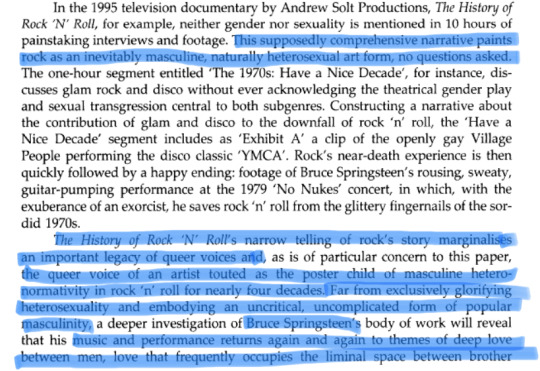

This supposedly comprehensive narrative paints rock as an inevitably masculine, naturally heterosexual art form, no questions asked.
The History of Rock ‘N’ Roll’s narrow telling of rock’s story marginalises an important legacy of queer voices and...the queer voice of an artist touted as the poster child of masculine heterosexuality in rock ‘n’ roll for nearly four decades. Far from exclusively glorifying heterosexuality and embodying an uncritical, uncomplicated form of popular masculinity...Bruce Springsteen’s...music and performance returns again and again to themes of deep love between men, love that frequently occupies the liminal space between brother and lover, a romantic ‘darkness on the edge of town.’
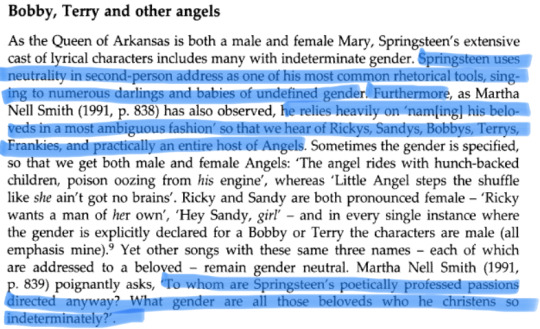
Springsteen uses neutrality in second-person address as one of his most common rhetorical tools, singing to numerous darlings and babies of undefined gender. Furthermore...he relies heavily on ‘nam[ing] his beloveds in a most ambiguous fashion’ so that we hear of Rickys, Sandys, Bobbys, Terrys, Frankies, and practically an entire host of Angels.
‘To whom are Springsteen’s poetically professed passions directed anyway? What gender are all those beloveds who he christens so indeterminately?’


The ‘Backstreets’ lyrics are strictly gender neutral. Beyond the scope of pronouns, however, I argue in favor of reading the song as the story of betrayal between male lovers based on the overall content of the lyrics. Springsteen takes up iconic ‘masculine’ themes in this song that he explores in many others.
It is the overtly male landscape of ‘Backstreets’ that leads many to interpret the narrator and Terry as two male friends. But just what is the nature of this friendship? What makes their lives together so forbidden that they must hide on the backstreets? Lines like ‘Sleeping in that old abandoned beach house’ and ‘With a love so hard and filled with defeat’ suggest a romantic liminality in the characters’ relationship. The language is quite emotionally charged for a strictly platonic friendship.
Regardless of any particular listener’s own gendering of ‘Backstreet’s’ Terry, the fact that Springsteen himself has refused to definitively say one way or the other is in itself a queering of the character.
Springsteen...essentially links a photo of himself gazing lovingly at his male friend with the romantic feeling of such lyrics as ‘Laying here in the dark you are like an angel on my chest / Just another tramp of hearts crying tears of faithlessness.’


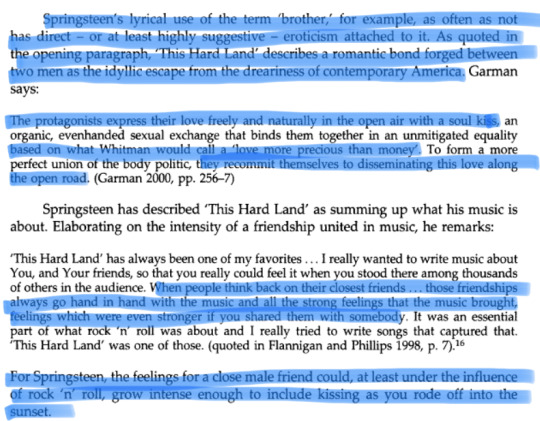
Among Springsteen’s new influences was Walt Whitman...Springsteen mirrored the significance of homosociality and homoeroticism inherent in Whitman’s vision. Whitman spoke extensively in terms both spiritual and sexual about his feelings for his fellow ‘brothers,’ which he distilled into the concept of ‘adhesive love.’
Throughout the epic poetry collection Leaves of Grass, written between the 1850s and 1890s, Whitman interweaves his views of the United States with his love for its men. Many Springsteen songs read like Whitmanian portraits of the American moral landscape, not a few sharing Whitman’s erotic language to describe his feelings for his brothers.
Springsteen’s lyrical use of the term ‘brother,’ for example, as often as not has direct - or at least highly suggestive - eroticism attached to it. ... ‘This Hard Land’ describes a romantic bond forget between two men as the idyllic escape from the dreariness of contemporary America.
The protagonists express their love freely and naturally in the open air with a soul kiss...based on what Whitman would call ‘a love more precious than money.’ ...they recommit themselves to disseminating this love along the open road.
When people think back on their closest friends...those friendships always go hand in hand with the music and all the strong feelings that the music brought, feelings which were even stronger if you shared them with somebody.
For Springsteen, the feelings for a close male friend could, at least under the influence of rock ‘n’ roll, grow intense enough to include kissing as you rode off into the sunset.


...the performances that culminate in Bruce and Clarence’s passionate kiss are those of songs about the fantasy of escaping together... Springsteen’s slide across the stage to meet Clemons’s waiting lips is a climactic corporeal embodiment of the lyrics he sings. But with the subversion of gender from the abstract woman of the storyline to Clemons’s very real person, is Springsteen not so subtly indicating just whose ‘velvet rims’ he wants to wrap his legs around, who he really wants to climb into his car as he ‘pulls out of here to win?’
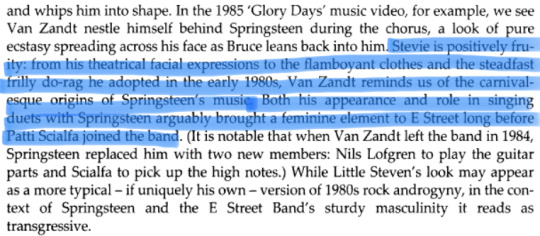
Stevie is positively fruity: from his theatrical facial expressions to the flamboyant clothes and the steadfast frilly do-rag he adopted in the early 1980s, Van Zandt reminds us of the carnivalesque origins of Springsteen’s music. Both his appearance and role in singing duets with Springsteen arguably brought a feminine element to E Street long before Patti Scialfa joined the band.
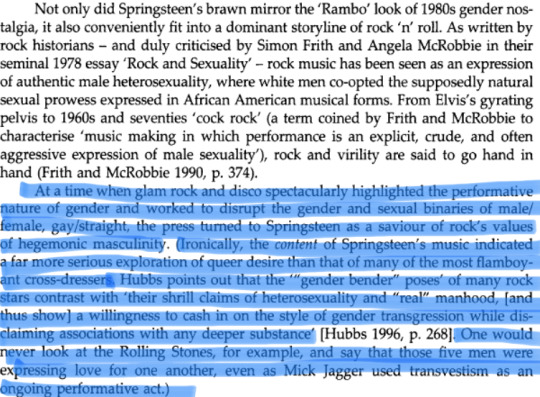
At a time when glam rock and disco spectacularly highlighted the performative nature of gender and worked to disrupt the gender and sexual binaries of male/female, gay/straight, the press turned to Springsteen as a saviour of rock’s values of hegemonic masculinity. (Ironically, the content of Springsteen’s music indicated a far more serious exploration of queer desire than that of many of the most flamboyant cross-dressers. Hubbs points out that the ‘“gender bender” poses’ of many rock stars contrast with ‘their shrill claims of heterosexuality and “real” manhood, [and thus show] a willingness to cash in on the style of gender transgression while disclaiming associations with any deeper substance.’ One would never look at the Rolling Stones, for example, and say that those five men were expressing love for one another, even as Mick Jagger used transvestism as an ongoing performative act.)
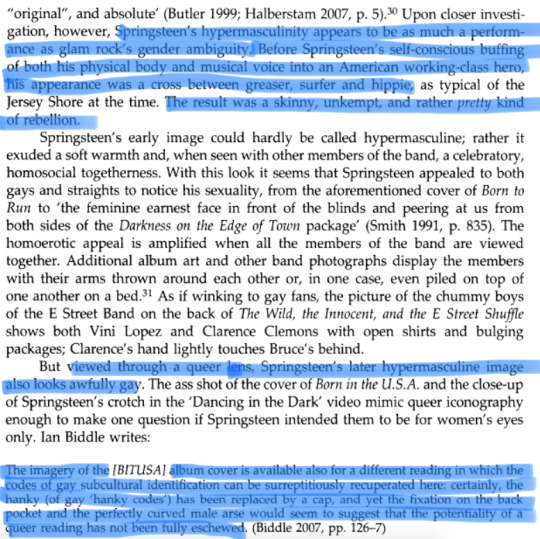
Springsteen’s hypermasculinity appears to be as much a performance as glam rock’s gender ambiguity. Before Springsteen’s self-conscious buffing of both his physical body and musical voice into an American working-class hero, his appearance was a cross between greaser, surfer and hippie... The result was a skinny, unkempt, and rather pretty kind of rebellion.
...viewed through a queer lens, Springsteen’s later hypermasculine image also looks awfully gay.
The imagery of the...album cover is available also for a different reading in which the codes of gay subcultural identification can be surreptitiously recuperated here: certainly, the hanky (of gay ‘hanky codes’) has been replaced by a cap, and yet the fixation on the back pocket and the perfectly curved male arse would seem to suggest that the potentiality of a queer reading has not been fully eschewed.

Springsteen precludes definitive determination of sexual preference, mooting a fundamental constraint whereby our culture knows us and names us. Such mooting matters not just because inquiring minds want to know, but because undermining this constraint calls into question conventional representations of love and traditional musical constructions of desire.
Bruce Springsteen’s sexual and gender ambiguity is not only a challenge, it is an invitation... ‘The best records (the ones that give us the most pleasure) are the ones that allow an ambiguity of response, letting us be both the subject and object of the singers’ needs (regardless of their our our gender).’
For Springsteen’s LGBT audience...his queer music is pure pleasure. While one may hope for the day that Springsteen will play ‘My Lover Man’ onstage, the songs with liminal romantic desires no less indicate that our musical hero is a sexual ‘tramp like us.’ As Nadine Hubbs writes, ‘Ambiguity is not particularly confusing to queer subjects to whom its utility and indeed necessity are intimately known.’
#quotations#rosalie zdzienicka fanshel#bruce springsteen#music criticism#queerness#queer themes#queer masculinities#gender#homoeroticism#clarence clemons#steven van zandt#walt whitman#i am obsessed with this article#obsessed with it#i was having backstreets feelings#and did a weird web search#and stumbled upon this#these are some of my favorite excerpts#but honestly just go read the whole thing#it’s SO GOOD
155 notes
·
View notes
Text
Muse - Absolution (2003)
After years of waiting, loaded with trials and experimentation, apocalypse finally has a soundtrack. No, it’s not the angsty, heady crooning of yet another musician in love, it’s not the introspective Beatle having seen the Truth, it is not Johnny Rotten tearing down the Establishment (again), and it isn’t the self-destruction a James Hetfield would growl about.
Apocalypse as a genre has been claimed and made a natural home in, and by a seemingly unassuming young band hailing from the idyllic seaside Middle Of Nowhere, Teignmouth, Devonshire in England: alt-prog rockers Muse.
Muse’s 3rd studio album Absolution (released in 2003) picks up on the big sounds and potential the band had been showing throughout their second album and takes it twenty notches higher. The instrumentation is solid, the rhythms are tight, the guitars loud, the sound, bombastic in moments and delicate, vulnerable and beautiful in the next, the lyrical themes are exploratory, and the band themselves seem to find their feet and lay down the foundations of what even today makes up their signature ‘Musey’ sound.
Yet that little summary couldn’t begin to do justice to the grandiose and power this album packs. At it’s finest, Muse take you on a fifty-two minute trip out of the world (quite literally, as the titular track ‘Sing For Absolution’s music video features the band jetting off into outer space to escape the planet only to have their spaceship crash down into a burning, post-apocalyptical London), charming and haunting you with dark, sustained Rachmaninoff-esque piano breakdowns and blowing you away with larger-than-life drums, distorted guitar and bass working in perfect synch to build up a rising tide-wall of sound that may make it hard at times to remember that there are but three musicians in the recording rooms shaking up your world, as singer Matt Bellamy wails, sings and warbles on about facing death (‘Thoughts of a Dying Atheist’), running out of time (‘Time Is Running Out’), meeting up with the Devil himself (‘The Small Print’), and changing the world (‘Butterflies and Hurricanes’), amongst other things, with each song bearing as Muse-like a name as there comes.
And Matt Bellamy, contrasting this album with their previous efforts, said in an interview that Absolution “is more about us being personable, about us being normal people at home”.
Well, normal Matt Bellamy at home, that is.
The album is introduced with a stomping, twenty second intro, the sound of boots getting closer and heavier, culminating in a single phrase: “Siege heil… marsche!” Twenty seconds in, the apocalyptical themes have already begun kicking in.
But before you have the time to breathe, the first song of the album, ‘Apocalypse Please’ begins, coming right at you with all of Bellamy’s pensiveness and despair, heavy ‘apocalyptical’ piano chords and drums crashing down on you as Matt declares that Earth needs a miracle and that “this is the end of the world”, layering the chorus as multiple Bellamy’s seal humanity’s fate.
The song’s mid/low tempo (around 80bpm) and loud vocals—almost cries of despair, really—and the closing bars with amplified, sustained single bass notes under forceful piano run-up chords, work quite well in conjuring up quite the image the band is looking to build and set the scene for the rest of the album to come.
Following this is one of the singles off the album, ‘Time Is Running Out’, starting with a low, almost choking yet flowing bassline with Bellamy almost breathing out lines like ‘I think I’m drowning/Asphyxiated/I want to break this spell that you created’, a song that starts out soft, restrained, then building up to the chorus as a tormented Bellamy tries to break free and realises that their time is running out, again employing the signature Muse technique of layering multiple guitars and vocals to build up a wall of sound, amplifying Matt’s thoughts, as does its twin later on the album, ‘Hysteria’.
On the titular track, ‘Sing for Absolution’, Bellamy seems to find a Muse of his own, turning inwards to a much more relaxed tempo. The band makes effective use of bassist Chris Wolstenholme’s staccato bass, offset and complemented by the almost dreamlike delayed, echoing guitars and pianos, to cook up an image of a lonely, reflective singer up alone in a room on the top floor of a house, sitting in the faint blue gleam of starlight, gazing out the window into space, thinking about his own life (‘Tiptoe to your room/A starlight in the gloom/I only dream of you/And you never knew’).
On ‘Stockholm Syndrome’, Matthew Bellamy takes the tried and tested ‘captor-and-captive-fall-in-love’ narrative, a darling of writers and musicians everywhere, and breathes new life into it by adding a new dimension of emotions to it, playing on the presumed captor-narrator’s guilt, confusion and sense of hopelessness (‘And she’ll scream and she’ll shout, and she’ll pray/And she had a name’; ‘We’ll love and we’ll hate and we’ll die/All to no avail…’; ‘This is the last time I’ll forget you… I wish I could’)
Muse use drummer Dominic Howard’s drums; pounding, loud and noticeable as a heartbeat in a quiet room; and Bellamy’s trembling vibratos to effectively paint the brutality and vulnerability; indeed, in the last chorus, behind the brute forces crashing on the guitars, bass and drums, one can hear the almost fragile, delicate piano arpeggios in the background, swallowed up by the guitars, almost hidden, protected, in a story that extends beyond the words.
Muse’s ability to switch from a light-hearted, fast-paced tone to a brooding, dark, haunting wail with effortless ease and grace stands out throughout the album and particularly on the sixth track on the album, ‘Falling Away With You’. The song, almost a hidden gem tucked away snugly in the middle of the album, is one of the few times the man who would go on to sing about conspiracy theories, the second law of thermodynamics and uprisings, turns inward and reflects on the people in his life and his relationships with them.
The song’s opening is slightly similar to Blackbird by the Beatles, with a quiet, reverberating guitar over a near-silent backdrop as Bellamy sings about his fears of forgetting a loved one and how relationships change, slowly building up and letting his bandmates catch up in a sort of relay-race, to a chorus that bursts to life with a screaming Matt falsetto-ing to a climax as the band fades to make space for Bellamy to calm down again, and the cycle continues.
It would be fair to say that the bass line drives the next track off the album, ‘Hysteria’. The song opens with a booming bass riff and all the straight faced extravagance that is both the band’s signature and legacy. A three-way harmonic melody solo rages on in the upper octaves that run in the background of the last chorus as a tormented Matthew tries to break free of his inner demons and Muse bring the song to a close in a manner worthy of a stadium closure.
Of course, it wouldn’t be a Muse album without experimentation, and while Muse aren’t recording in zero gravity (for now), the band takes to string arrangements in search of new sounds and avenues on ‘Blackout’, dishing up a slow lament, complemented by fuzzy single note tremolos, and it only gets better on the next track, ‘Butterflies and Hurricanes’, as Bellamy sounds off a call to arms to get up and change the world, and “use this chance to be heard”. The strings create a dystopian air, with a terse, fuzzy bass running underground and Wolstenholme’s backing vocals playing in the open skies as Bellamy commands his summoned army to action. His emotions seem to spill out of his fingers onto the piano in sudden gushes in a beautiful, flying, sustained solo that stands even today as a testament to Bellamy’s superior skills on the keys.
Absolution marks a sonic departure from Origin of Symmetry (2001) in that the production seems a lot more refined and cleaner. The band favours richer, fuller sounds: more gain-heavy guitars and bigger drums that would feel home in arena, as opposed to the “dirtier”, more grungey, piercing sounds used on their previous endeavours.
However, there is tons for fans of the band to savour (in addition to a very musically accomplished record) on the track ‘The Small Print’. Bellamy returns to one of his pet themes as he takes on the role of the apathetic Devil (‘I’m a priest God never paid’), watching the world and its happenings with an omniscient eye (‘I hope you’ve seen the light/because no one really cares/They’re just pretending’), a nod back to Origin-era songs like ‘Hyper Music’. The band’s commendable execution, both with the lyrics as well as the rough, almost lo-fi edge in the production on this piece make it astonishingly powerful for a song with a niche theme and a simple guitar riff repeating over shifting root bass notes.
There really is never an uneventful moment on the fifty-two minute, thirteen-second record. The band throw familiarity to the winds on their next track, ‘Endlessly’, a song both very predictably Muse-like, yet something quite unlike anything the band had done before. Trading in the guitar for dampened, “muddy” synths, Muse give you the feeling of sitting underwater, drowned in the waterfalls of sound. Synth chords fall silently around you and ripple under the layers of arpeggiated synths that build up the wall of—excuse the pun—endless sound and lock you into Bellamy’s greyness as he promises a loved one the he’ll do anything for them but won’t leave them– until finally deciding that that moment never comes and calming down to a finish, internal turmoil now at rest.
Bellamy, mind wandering like a child, turns to more existential ideas soon after on ‘Thoughts Of A Dying Atheist’, a fast-paced, energetic and curiously happy-sounding piece, musically, for a song that is about an atheist at the end of their life, knowing that what lies ahead of them is nothingness (‘It scares the hell out of me/And the end is all I can see’) and seems to create an ironic contrast between the energy of the song and the narrator’s nervousness that works to the band’s credit.
Muse continue to shock and awe, haunt and bewitch you right up to the very last song on the album, ‘Ruled By Secrecy’. Lyrically perhaps the most quotidian song on the album, this track deals with the pressures in life and realising that you’ll never be on top. Lyrically and musically, it’s one of the darkest pieces in the band’s repertoire, beginning with low, quiet pianos. A ghostly, whispering Matt, sings with sustain and echo, recreating an almost surprisingly gothic, medieval church-like sound reminiscent of the Middle Ages, bringing to mind fear, uncertainty and mistrust (‘they’ll hide everywhere/no one knows who’s in control’), gathering force and building up to the signature piano crashing chord work that defines this album throughout.
The song, and consequently the album, ends with a final touch to the cymbals, a subtle finish to an album with so much grandiose, its power and assertion leaving the listener reeling and the band flying high on yet another tasteful record successfully polished off.
Watch out Martians, Muse are coming.
------------------------------
A review for Absolution I wrote back in first year in 2018. Happy 20 years of Absolution! I'm happy to note that this time around, with the reissue, Fury will not be left off the album anymore, and my review will (happily) be out of date come November.
#god I wish I was still into writing longform reviews. I don't think anyone reads that kind of stuff anymore.#This was for a 1500 word final essay for a writing elective I took in first year; the only kind of place it would still be tolerated lol.#Muse band#Muse#Musers#Muse Absolution#20 years of Absolution!#2003#rock music#music criticism#music journalism#matt bellamy#chris wolstenholme#dom howard#alt rock#space rock#long post#long read#just block that tag for this blog if it doesn't work for you#writing
14 notes
·
View notes
Text
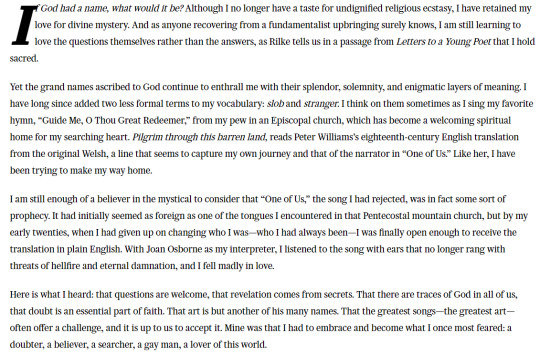
Jason Kyle Howard, "If God Had a Name," (on Joan Osborne's "One of Us") in Oxford American (2020)
#op#essay#religious writing#spirituality#theology#music criticism#creative nonfiction#joan osborne#pentecostal#literature#oxford american#southern gothic#queer literature#jason kyle howard#prose#religiousity#literary journalism
6 notes
·
View notes
Text
"Desire is the way your heart pumps, it’s guttural and lives in the way the wind greets you on your birthday. You are older and hungry. You have it in you to get what you need.
Desire bubbles in a laugh, a sunrise, and I am happy because I can be."
- Welcome To My Island (And My Problems)
(a snippet from an upcoming essay.............)
#my writing#oooooo so nervous sharing my own writing again!!!!!!#pls enjoy#im being so brave#caroline polachek#welcome to my island#substack#desire i want to turn into you#personal essay#essayist#music criticism#cultural criticism#love quotes#writers on tumblr#writeblr#writers and poets#gryfhindor#women writers#writerscommunity#romance
7 notes
·
View notes
Text
Honestly I think that in order to be a critic you have to prove that you're capable of taking something seriously despite having an off-putting aesthetic. If you want to have any credibility you need to find something juvenile or furry or an MLP fan project and prove that you can engage with it on its own level instead of outright dismissing it as beneath you.
3 notes
·
View notes
Text
What's behind the collapse of music journalism? In brief - almost anything corporate capitalism touches it wrecks.
A more detailed view:
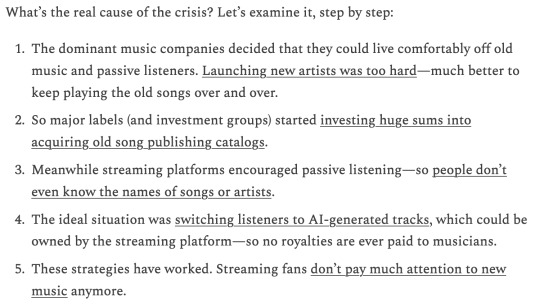
"The irony is that exciting new music is still getting released—but almost nobody hears it. The system actively works to hide it."
3 notes
·
View notes
Text
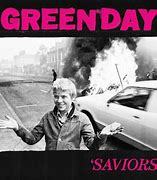
Barely Living in the 20’s
(Green Day’s new album)
Stephen Jay Morris
1/24,2024
©Scientific Morality.
I saw a pink flamingo on someone��s front lawn the other day, it reminded me of Taylor Swift. She is today’s American icon. I saw a helium balloon floating in the sky with Charlie Kirk’s face on it—The jealous Christian Nationalist, who wants to tame that Taylor shrew. Fuck that dude! I am waiting for an Amazon drone to deliver the latest Green Day album to me. I listened to the whole album on YouTube. I can’t wait!
I am not going to give the typical music critic’s review here. Some may love it. Some may dislike it, and anyway—does anybody listen to critics anymore? Go log on to YouTube and judge for yourself.
Music is the soundtrack of life. Believe me, it is. When I listen to a song from 1959 to 2024, it will conjure up memories in me. Yes, the olfactory route can do that to me, too, but music? Yeah, now that’s the ticket!
In 1969, at 15, I was jumped by a street gang. They took me back to their apartment and worked me over. On the radio, “My Cherie Amour” by Stevie Wonder, was playing. Now, every time I hear that song, I relive that painful moment in my life. It is a beautiful song. Then there are other songs that remind me of my ex-girlfriends. Or times in history.
I’ll say one thing about this album’s collection of songs. Their influences are obvious and fun to identify. So what? This could have been “American Idiot, part two.” You think I care?
These songs, however, are an emotional necessity to maintain one’s sanity in 2024. From genocide to political buffoonery, while humanity is making an ass of itself, an alienated poet spells out his alienation with lyrical rhymes. Like Billy Joe Armstrong, I am disenchanted with current American ambiance. Niro played the fiddle as Rome burned. Me? I play guitar as the American empire burns. Why not? Somebody should. Green Day does. They are not just a “let’s party band.” They’ve got poetic observations they want to share with everyone. My ears are open. Jesus! We need a soundtrack to these days of insanity!
Music won’t change the world, but it can change your mind. I cling on to that proposition like a crucifix in the palm of my hand. I need the tintinnabulation of bar chords and the feedback of amps. Before I used to go to demonstrations, I’d slap on my MC5 album to psyche myself up. I need emotional cleansing or the acids in my belly will eat me alive. Green Day has the goods to do that.
This summer, there will be a protest at the Democratic Party convention in Chicago. The last time it happened was in 1968. The MC5 performed at the festival of life at Grant Park. They were the only band who had the courage to show up. Wouldn’t it be neat if Green Day showed up? Yeah. It would.
#stephenjaymorris#poets on tumblr#american politics#youtube#anarchopunk#punk rock#green day#music criticism
3 notes
·
View notes
Text
JAY-Z & Linkin Park - "Collision Course" (2006)
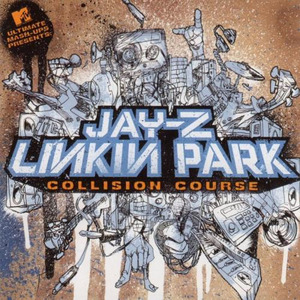
This shouldn't work, but it totally does. This was a ridiculously fun listen.
First listen: true
Would listen again: oh absolutely
Good for: not taking life too seriously, bouncing around your house
2 notes
·
View notes
Text
Where Do You Get Your Ideas b/w What Are Your Songs About
By the time I'd been in bands for a few years, I could play the songs more or less automatically. I'd pick up the guitar and stand in front of the mic, and start the song, largely without thinking about it—like I was giving in to a potentiality that was already there, like following your normal walking path to school or the subway—and then, a few minutes later, I'd have played the song. I could think about other things when playing the song; I could be high or drunk and still play the song well.
There's something mechanical about this, like riding a bike: you give your body a broad request ("make this bike go forward", "play this song") and it accomplishes the task without attending to the thousands of micro-tasks like remembering the lyrics or the chord changes, or shifting position on the guitar, or where to breathe.
But there's something undeniably magic about it, too, because you're not riding a bike, are you? You're not even performing some other muscle-memory task like hitting a ball or sewing a stitch. I could feel the potential of the song there before it existed, and so could my bandmates, but no one else could. That potential was purely in our minds. When you play music, you are bringing something new into existence and then letting it vanish, note by note. And if you've got a band, you're creating this sound together, reaching back into your shared memories to bring them back into the world, all without making any conscious plan.
That experience isn't there in writing, at least not for me. As much as I enjoy the act of putting words on a page, and can get into a flow, at the end of the day, I'm taking sentences that appear in my consciousness and typing them into a computer. Sure, there's something ineffable about where the ideas—and even words—come from, but that's largely invisible in the finished product. (Though not so much that "Where do you get your ideas from?" isn't a perpetual question of authors. From the unknowable confluence of my accumulated life experiences and the random chance of the day’s shape, my dude!) When we experience writing, as readers, it's not like a concert. We're not watching someone tell an extemporaneous story, even one they've told a hundred times before. We're reading a heavily-edited record of such a performance, many drafts ago.
That's one of the things that makes writing about music so hard: the absolute need to honor that magic of a musical performance, coupled with the absolute inability of writing to convey it in any direct way. I think—and this drives musicians absolutely nuts, I know—the only way to convey that magic is by talking about meaning, even the personal aspects of meaning. By saying what the song makes you, as a listener, think about. This song is about the way country music radio treats women or This song reminds me of riding in a car with my mother or just This song sounds like a cricket stuck in an air vent you can never find. It’s like you’re reverse-engineering those scores that are just instructions, like "Play these sequences in any order, but stop every once and a while and listen"—but instead of taking a text prompt and making music from it, you’re taking a musical prompt and trying to follow its instructions to create a text. It’s an act of translation.
That’s frustrating, because we want texts to be definitive, want them to be the truth. We want to know what the song is about. But all translations are inexact, are based on what the translator brings to it. Sure, it’s constrained by what’s there in the source. But then the rest is all you. What is the song about? Every song is about the same thing: the experience of being inside the song, for as long as it lasts - and what it’s like to be the person who went through that experience. Who heard the notes come into being and then vanish.
8 notes
·
View notes
Text
SOPHIE ELLIS-BEXTOR - "MURDER ON THE DANCEFLOOR" (2001) (2024)
youtube
23 years on and this groove's still got some life in it...
[7.11]
Thomas Inskeep: Sophie Ellis-Bextor should've been the next Kylie — and for a couple years, almost was. Her 2001 debut album Read My Lips spun off a trio of top 3 singles in the UK, including this one, which has over time become her true classic. Dua Lipa's entire career was birthed in this single, the dictionary definition of ebullient dance-pop. (It's fitting that Lipa's "Houdini" is currently the most-played song on UK radio as this single is re-ascendant.) SEB has never gone anywhere: she's still making music, touring (based on her 2022 Sophie Ellis-Bextor's Kitchen Disco (Live at the London Palladium), she still sounds great), and is now a DJ on BBC Radio 2. She just didn't become the massive pop star she deserved to be. Now, thanks to its placement in a climactic scene in Saltburn, her greatest single is getting its flowers, climbing back up to #2 in the UK (so far — my fingers are crossed it can make it that final notch higher). "Dancefloor" still sounds fresh, certainly fresher than the glut of '90s-sampling dance-pop dominating the UK charts. This single sparkles, SEB giving a knowing wink as she sings, especially on the line "gonna burn this goddamn house right down." She knows what she's doing here: making magic.
[10]
Edward Okulicz: I bought this on single back in 2002, which tells you something (other than that I am old): it was an irresistible bit of sparkly disco radio pop back in the day. Move it forward or backwards a few years and it might have been an indie rock song for someone else, a filter house record, or (gulp) a Ronan Keating record. Fortunately that never occurred, and it's a delight to see a classic gain new fans from age groups and territories that didn't get it on saturation rotation. Part of it's the solid song by Gregg Alexander, who at his best was a master craftsman of a much-maligned form. Another part of it's the much nimbler, slinky production compared to the rest of his soft-rock oeuvre. And a very, very large part of it is the Debbie-Harry-but-English pose of Ellis-Bextor, too cool to do anything but be filmed dancing from the waist up while she stomps her heel into your eardrums. "Murder" really has everything — a catchy chorus, the tinniest guitar solo ever, hooks that fall as much off the words as the melody — and so is perfect for every occasion, even a movie I am never, ever going to see.
[10]
Alfred Soto: Like the Pet Shop Boys' "Rent," waaayyyy too good for Saltburn — perhaps Emerald Fennell thought their incandescence would rub off on her as if it were glitter. Part of a vanished climate of French house-inspired crossover pop like Kylie Minogue's "Love at First Sight," Sophie Ellis-Bextor presages Katy B's regular-person anonymity: she surveys the strings and rhythm guitar licks like a party hostess keeping an eye on the band while sipping her prosecco.
[8]
Alex Clifton: I haven't seen Saltburn and frankly have no interest in it, but this film has led to the Sophie Ellis-Bextor renaissance which is a net good for society. "Murder on the Dancefloor" is just brilliantly composed and produced; it feels as fresh today as it did twenty years ago. There are so many thrilling little moments from Ellis-Bextor's vocal delivery: the way her voice curves into "about your kiiiiiind," the little rasp in "there may be others," the little trill of "dancefloor" in the bridge. I feel so biased writing this review because I've literally been listening to this song since I was a kid, but I'm so jazzed about "Murder" finally receiving the love it deserves.
[10]
Ian Mathers: How can you not love pop music when it'll randomly do things like this, suddenly giving us a song to review from before the earliest days of the Jukebox, that is here purely because of its use in a movie that I have not seen but am informed was probably picked on the basis of Ellis-Bextor's plot arc in the music video. And if I'm not willing to go to bat for it quite as hard as I would for "Running Up That Hill," I did love "Murder on the Dancefloor" in 2001 and it still sounds great now. I don't find myself having any reaction more complicated than happiness at hearing it again and that particular joy of people liking something you like.
[8]
Nortey Dowuona: If you told me this came out in 2021 and Emerald Fennell asked Sophie to use it in her movie set in 2001 because it was just that on point in depicting the time, I would agree. Then after taking out my phone, I'd be punched in the face and meekly give up my phone. Then, after watching you sprint into a nightclub, I'd immediately thank goodness you didn't ask for the passcode and run like hell for the closest subway. I am three stops from home before I remember this did not actually come out in 2021; there are other Sophie Ellis-Bextor songs and jailbreaking is a thing now.
[10]
Leah Isobel: RIP Mark Fisher. You would've written a hell of a blog post about Saltburn.
[7]
Mark Sinker: Necessary digression 1: heraldry as a science in Europe is roughly 900 years old, a bright and stylised easy-read guide, highly rule-bound and policed, to class and land and title — which is to say to material history (its jargon-field is still mostly words not otherwise used in the UK since the 14th century; even property law is less lousy with extinct Norman French terms). And like many very aged things, it has necessarily also passed through phases and fashions, as technologies of display arrive and depart. In fact the first inkling I had that I wasn’t going to get on with Saltburn was the typeface chosen for the title on-screen at the outset. It’s a font with a fairly specific ill-set ungainliness to it: it wants to have the weight of "pleasingly and weirdly old; not how we do things now," but it might just as well be some off-the-peg super-modern studio confection — or even (though I slightly doubt this) something custom-fashioned purely for the film. There’s no discernible care to the choice. Necessary digression 2: back in the late '70s when Peter Saville was busily and insouciantly borrowing from this or that actual-real document or design, of such-and-such era, part of the point was the severity of the decontextualisation — except there was a rigour to the carelessness. The item was being supplied with an iconicity (the very word) pulling you in towards whatever the item was that Factory Records was then placing on the market. The surface glamour of the original was to be funneled through in such a way that its weight amplified only the new relationship. In fact (in its stylised easy-read way) Saville’s work was ruthlessly the opposite of heraldry, so very good at managing the ambient melancholy that suffuses the wider Factory moment; all the blocks and counterspells necessary to conjure here beyond the end of creative time as the context for the music to have presence. Anyway, long story short (lol) Saltburn – which would love to believe it has accessed the aura, for example, of the cover of New Order’s Technique — is attempting to juggle the same double burden. It wants to conjure a play between the decontextualised pull of 24-hour-party-people hedonism and the real ineluctable unremovable weight of actual history and actual class and actual land and actual title. Except for its story to work it needs both dimensions (hedonism and weight; heraldry and careless scribble) to register, as Saville absolutely didn’t. No block, no counterspells, nothing to dampen the disturbances — so when poor old Sophie EB’s voice and poise are scalpeled out of their 20-year-old chart context and abruptly c/p-ed into whichever late-stage scene it is, well, here they are, as a clumsy synopsis (calculation, side-eye, dancing, death) the structure really shouldn’t require, in a role the song is the wrong mood (a faintly gauche trifle, a chirpy hustle) to deliver. The movie never works out where it gets its deep reveal from, or what shape its politics are (if politics is even a useful word here). Ill-set ungainliness all over again: the carelessness floods back into the borrowed adornment, and breaks it in pieces. I don’t even love this song that much but I hate how it gets what value it has so gracelessly driven out of it.
[2]
Jacob Satter: At the risk of killing the groove, this is a pretty boring choice for a manufactured revival track. Call me back when the kids discover "It's In Our Hands."
[4]
Jacob Sujin Kuppermann: I'm glad everyone's having fun here but the more I try to enjoy this — either on its own terms or as an icon of nostalgia — I get nothing. Unremarkable in any year.
[4]
Lauren Gilbert: It was a [10] in 2001, it's still a [10] now.
[10]
Katherine St. Asaph: The thing about it being 2024 is that in the intervening 20-plus years since "Murder on the Dancefloor" came out, approximately ninety million more disco-revival tracks came out. Some of them are by Sophie Ellis-Bextor, even. And so many of those tracks are smooth where this is stiff, magisterial where this is timid (and not in a winsome Katy B kind of way; Katy got better arrangements), charged where this is inert and just generally unmurderous. It's actually startling how inessential this sounds by comparison.
[3]
Oliver Maier: Even as a youth, before my brain was burdened with indulgent critical vocabulary, I felt like this song just didn't work. I can't pin down whether "Murder" is knowingly a little chintzy (dare I say camp?) or if it's just cheap tat trying sincerely to sound boutique. Benefit of the doubt granted or not, Ellis-Bextor sounds like she's doing karaoke off the sofa.
[4]
Michael Hong: When Ellis-Bextor pauses, it's easy, like a quick and graceful end to a conversation rather than the expectant response to her more spirited word choice. She's committed to this casualness, easily slipping away at the hint of a faux pas, which makes the occasional lingering word more charming. "About your kind," she sings, as if looking you up and down, wondering if she's got it wrong this time; the word "others" is trailed as if she's daring you to eliminate the competition. In that way, "you better not kill the groove," delivered with such nonchalance, becomes a fervid instruction.
[7]
Will Adams: It's cute, Sophie is ever-charming, but there's real problem when you've got songs in your catalog with titles like "Bittersweet" and "Heartbreak Make Me a Dancer" that offer way more palpable drama than the one with the word "Murder."
[5]
Joshua Minsoo Kim: Every other line is threatening here. “Stay another song,” “Don’t think you’ll get away,” “You better not kill the groove.” Sophie Ellis-Bextor isn’t demanding fear, though. That’s what makes “Murder on the Dancefloor” so irresistible: she sounds like a friend, albeit one who’s deathly serious about having a good time. When you hear her, you believe it can be this good for you too.
[8]
Taylor Alatorre: Wow. They were allowed to make these slick disco-pop reimaginings with actual guitar solos back then? We must retvrn.
[8]
Tara Hillegeist: It feels like a time capsule from another era in pop music entirely, because it is. There was a time when Ellis-Bextor's stately, imperial, nigh-inhuman precision of a delivery felt like nothing so much as the edifice within which pop star royalty could be crowned, particularly in the world of UK pop; it's still hard, even now, to deny the simple pleasures of someone who knows what her job is and then executes it flawlessly. But it's been over two decades since this song originally bowed, and it must be said that it was the impact of songs like, yes, "Murder" itself that raised pop music's skill floor high enough that such icy professionalism now feels like the most tiresome part of it — Dua Lipa does this regularly, after all, and with equal anonymity. No, what saves it, and ensures the song remains nothing so much as a delightful diversion (conditions of its resurgence be damned, I say), are the sampled whoops that come in beneath the guitar solo; notwithstanding that such a slice of controlled disco can credit itself with having a guitar solo to begin with, but the canned hype is such a stupendously goofy touch. It humanizes the song instantly, stripping the archness of its artifice aside to reveal the awkward smile underneath. The moment passes, of course. But the smile lingers.
[7]
Anna Katrina Lockwood: I've been waiting 20+ years for an opportunity to issue a dissertation on the songwriting genius of Gregg Alexander and by god am I ready. Though it's hard to imagine it in a different form, "Murder on the Dancefloor" was apparently a cast-off single for Alexander's New Radicals debut, replaced by the equally glorious "You Get What You Give" — like, imagine being such a talented songwriter that you can just cast off a song like this, knowing you've got an equally great one to replace it with! "Murder on the Dancefloor" is just perfection in Ellis-Bextor's hands, with a galaxy of terrific choices in its production to go along with the amazing melodic structure. I still can't help but burst out laughing at the initial vocal hit in the intro on occasion, a perfect, delicately harmonized coo of "Murder!," cutting through the disco instrumental setup occurring all around. It's as great a moment of pop songwriting as I'm aware of — setting the expectation of the song's vibe from the outset. Ellis-Bextor's lyrics are outstanding, cleverly arch but not too shiny, in the thick of it yet also gliding past suavely. The song is incredibly detailed, a carefully calibrated piece — it lopes by with a relaxed stride rather than a reckless dash, a well-tailored Savile Row suit as opposed to an H&M tunic, cut to the millimeter. Yet it's also very clearly of the disco, built for singing along, difficult to avoid dancing to when it comes on. It turns on its heel at moments' notice, with layers of melody playing off each other throughout. Matt Rowe's efforts in production also deserve notice — this song sounds great, so distinctive that it is still eminently listenable 23 years on. I honestly have not a single thing to criticize about "Murder on the Dancefloor," and it's been a long time that I've considered it to be one of the truly great pop songs of my lifetime. It feels like incredibly just desserts to see it garnering so much praise now.
[10]
[Read, comment and vote on The Singles Jukebox ]
#sophie ellis-bextor#saltburn#music#pop#pop music#music writing#music reviews#music criticism#the singles jukebox#Youtube
7 notes
·
View notes